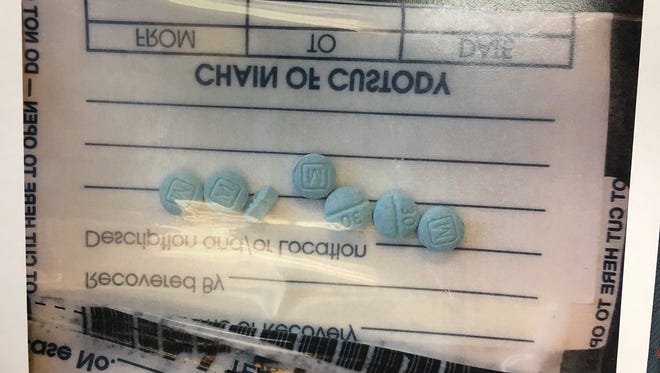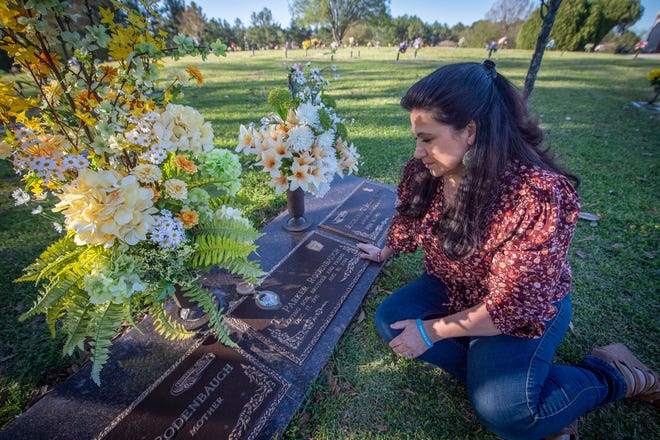Like the rest of the country, Mississippi has seen an alarming increase in the number of fentanyl-related overdose deaths during the pandemic. It’s a growing public health crisis that has pushed lawmakers in the state to pass legislation imposing stronger penalties on drug distributors linked to drug overdose deaths.
On Tuesday, April 19, Gov. Tate Reeves signed HB 607– better known as Parker’s Law. The measure specifically targets the sale of fentanyl and imposed a minimum of 20 years to life in prison on drug dealers connected to overdose deaths resulting from the transaction.
Previous versions of the bill have faced opposition from harm reduction advocates, who said that it would criminalize people living with addiction, keeping them from seeking help in the case of an overdose, resulting in more deaths.
CORONERS OVERWORKED:Hinds County coroners are ‘strung out, overworked and tired,’ handling 200 deaths a month
Cordie Rodenbaugh, the mother of Parker Rodenbaugh, for whom the bill is named, said that the measure that passed this year has safeguards that protect people who share drugs or call for help in the case of an overdose. It also includes a reporting requirement made by a non-partisan committee of the Mississippi Legislature, which will have to evaluate and report how many people are prosecuted every year under the provisions of the bill.
Rodenbaugh has fought to get a measure passed that holds drug distributors accountable for overdose deaths for several years.
Her son Parker died in 2014, from the toxic effects of synthetic LSD before his junior of college at Mississippi State University. The person who sold him the drug, Skylar O’Kelly was convicted of second-degree murder in addition to drug trafficking charges. The murder conviction was later overturned due to insufficient evidence.

Since Parker’s death, she has also advocated for families who have lost loved ones to drug overdoses and shared information about preventing overdose deaths.
Seeing the measure signed into law was bittersweet, Rodenbaugh said.
“It’s a happy, sad feeling. They have been so many deaths lately from fentanyl, it’s sad more deaths is what is making this happen,” she said.
Drug overdose deaths have skyrocketed in recent years. There were more than 100,000 overdose deaths in the U.S. in 2020 and 586 were Mississippians.

Deaths involving fentanyl climbed from 139 in 2019 to 313 in 2020, according to the Mississippi State Department of Health. More than half of these deaths involved the use of multiple substances and about a third were among people younger than 35.
One of the primary reasons for this health crisis is the availability of illicit fentanyl, which, unlike pharmaceutical-grade fentanyl, it can be cut, colored, scored and pressed to be sold as a counterfeit for other illicit drugs such as Xanax, Ritalin or Oxycodone, according to Col. Steven Maxwell, director of the Mississippi Bureau of Narcotics.
Fentanyl is extremely lethal and about 50 times more potent than heroin.
To address the prevalence of counterfeit pharmaceuticals, lawmakers also passed a law criminalizing the unauthorized possession and sale of a pill press and similar equipment used to manufacture them.
Reeves signed HB 679 – the Victoria Hugins’ Mississippi Pill Press law of 2022 – on April 12.
“The opioid epidemic has been an unparalleled tragedy that has taken the lives of far too many Americans,” Reeves said in a statement, adding,” This legislation is another tool that will help ensure our neighborhoods are drug-free.”
Maria Clark is a general assignment reporter with The American South. Story ideas, tips, questions? Email her at [email protected] or follow her on Twitter @MariaPClark1. Sign up for The American South newsletter. Follow us on Instagram, Facebook and Twitter.

